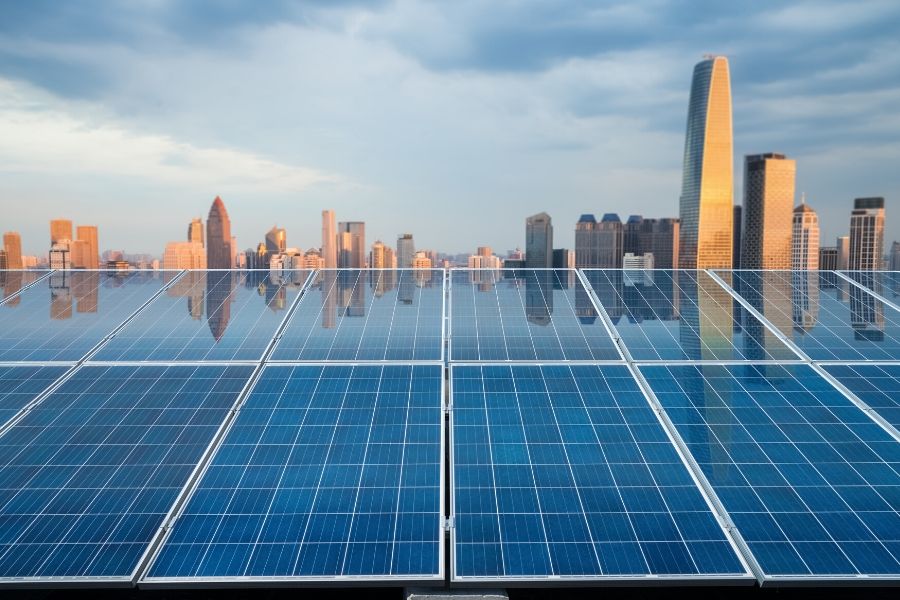In an era where sustainability and environmental responsibility have become paramount, businesses across the globe are turning to renewable energy sources to power their operations. Among the most impactful choices available is the adoption of commercial solar solutions, often referred to as “com-sol.” These solutions offer a myriad of advantages, ranging from reducing carbon footprints and cost savings to ensuring energy security. This article explores the transformative potential of commercial solar solutions, the benefits they bring to businesses, the customization of solar systems, the implementation process, and real-world success stories.
Advantages of Commercial Solar Solutions
Sustainable Energy for Businesses
Reducing Carbon Footprint
Embracing commercial solar solutions allows businesses to significantly reduce their carbon footprint. Solar power generates electricity without emitting greenhouse gases, making it a clean and sustainable energy source. By transitioning to com-sol, businesses can actively contribute to mitigating climate change and environmental preservation.
Cost Savings and Energy Independence
One of the most compelling advantages of commercial solar solutions is cost savings. By generating their electricity, businesses reduce their reliance on conventional utility providers, effectively lowering their energy bills. Furthermore, com-sol grants businesses a degree of energy independence, shielding them from the volatility of energy prices in the market.
Enhancing Corporate Social Responsibility
Adopting commercial solar solutions aligns with corporate social responsibility (CSR) goals. It demonstrates a commitment to sustainability and environmental stewardship, resonating with customers, investors, and employees who value businesses that prioritize eco-friendly practices. Such alignment strengthens brand reputation and fosters goodwill.
Financial Benefits and ROI
Long-term Cost Savings
Commercial solar solutions offer businesses the potential for long-term cost savings. Although the initial investment can be substantial, the ROI over the lifespan of the solar system is significant. With minimal operational costs and the potential to sell excess energy back to the grid, businesses stand to reap financial benefits for years to come.
Tax Incentives and Rebates
Government incentives play a crucial role in promoting the adoption of com-sol. Many jurisdictions offer tax incentives and rebates to businesses that invest in solar energy. These financial incentives can substantially offset the initial installation costs, making solar solutions even more appealing.
Increased Property Value
Commercial properties equipped with solar installations often experience an increase in their overall value. Solar-equipped buildings are seen as more attractive and environmentally responsible, making them more appealing to potential buyers and tenants. This added property value can be a significant financial asset.
Energy Security and Reliability
Mitigating Energy Price Volatility
Relying on traditional energy sources can subject businesses to price volatility. Commercial solar solutions provide a level of predictability by generating electricity on-site. This reduces the impact of energy price fluctuations on a business’s operational costs.
Backup Power and Resilience
Solar solutions with battery storage capabilities offer businesses an additional layer of energy security. In the event of grid failures or unforeseen emergencies, these systems provide backup power, ensuring critical operations continue without interruption. This resilience is invaluable for businesses that cannot afford downtime.
Consistent Energy Supply
Commercial solar solutions provide a consistent and reliable energy supply. Solar systems are designed to meet the energy needs of businesses, ensuring a steady power supply regardless of external factors. This reliability enhances operational efficiency and business continuity.
Customizing Commercial Solar Solutions
Assessing Energy Needs
Energy Audit and Consumption Analysis
The first step in customizing commercial solar solutions is assessing the energy needs of the business. This involves conducting an energy audit to understand current consumption patterns. Identifying peak demand periods and energy-intensive processes is crucial for tailoring the solar system.
Peak Demand Management
Effective peak demand management is a key consideration in com-sol customization. Solar systems can be designed to offset energy consumption during peak demand hours, reducing the reliance on grid power when electricity costs are at their highest.
Tailoring Solar Systems
Each business has unique energy requirements. Commercial solar solutions should be tailored to meet these specific needs. This may involve selecting the appropriate solar panel technology, determining optimal placement, and sizing the system to ensure maximum efficiency.
System Design and Integration
Solar Panel Selection and Placement
The selection of solar panels is a critical aspect of com-sol system design. The choice between monocrystalline, polycrystalline, or thin-film panels should align with efficiency goals and available space. Proper panel placement, considering factors like shading and orientation, ensures optimal energy generation.
Advanced Inverters and Monitoring
To maximize energy efficiency, advanced inverters and monitoring systems can be integrated into com-sol solutions. These technologies efficiently convert direct current (DC) electricity into alternating current (AC) and provide real-time performance data. Monitoring allows for proactive maintenance and troubleshooting.
Battery Storage Solutions
Battery storage systems complement commercial solar solutions by storing excess energy generated during the day for use during the night or in case of power outages. Integrating battery technology enhances energy security and grid independence.
Regulatory Compliance and Permits
Navigating Local Regulations
Navigating the regulatory landscape is essential when implementing commercial solar solutions. Businesses must be aware of and comply with local regulations, permitting requirements, and zoning restrictions. This process may involve securing the necessary permits and approvals.
Permit Acquisition
Acquiring the required permits is a crucial step in ensuring a smooth implementation process. Noncompliance with local regulations can result in costly delays and setbacks. Businesses often enlist the expertise of professionals who specialize in permit acquisition to streamline the process.
Environmental Impact Considerations
Com-sol implementations must consider their environmental impact. Assessments of potential environmental effects, such as habitat disruption or visual impact, may be necessary. Ensuring that solar installations are designed and implemented with minimal environmental disturbance is essential.
Implementing Commercial Solar Solutions
Installation Process
Professional Installation Teams
The installation of commercial solar solutions should be carried out by professional and experienced teams. These teams possess the necessary expertise to ensure the solar system is installed safely, efficiently, and according to design specifications.
Quality Assurance
Quality assurance is a fundamental aspect of the installation process. Rigorous testing and inspections are conducted to verify that the solar system functions optimally. Any issues or discrepancies are addressed promptly to maintain system performance.
Timelines and Project Management
Efficient project management is crucial to meeting installation timelines and budgets. Well-structured project management ensures that all aspects of com-sol implementation, from permitting to installation, proceed smoothly and on schedule.
Monitoring and Maintenance
Real-time Performance Monitoring
Commercial solar solutions are equipped with real-time performance monitoring systems. These systems allow businesses to track energy generation, detect anomalies, and assess overall system health. Proactive monitoring enables prompt response to any issues that may arise.
Routine Maintenance
Routine maintenance is essential for the long-term performance and longevity of com-sol systems. Scheduled inspections, cleaning, and maintenance activities ensure that the system operates at peak efficiency and minimizes the risk of unexpected downtime.
System Upgrades and Expansion
As technology evolves, businesses may consider system upgrades or expansion of their commercial solar solutions. Upgrades can enhance energy efficiency, while expansion allows for greater energy generation and cost savings.
Success Stories: Businesses Embracing Com-Sol
Case Study 1: Sustainable Manufacturing Plant
A sustainable manufacturing plant made a strategic investment in commercial solar solutions to power its operations. By harnessing solar energy, the plant achieved energy self-sufficiency and significantly reduced its operational costs. This sustainable approach to manufacturing not only enhanced the plant’s competitiveness but also showcased industry leadership in eco-friendly practices.
Case Study 2: Retail Chain’s Solar Journey
A nationwide retail chain embarked on a solar journey to align with its sustainability initiatives. The installation of com-sol systems across its stores not only resulted in cost savings but also engaged customers and fostered brand loyalty. The retail chain’s commitment to renewable energy became a showcase for responsible corporate citizenship.
Case Study 3: Office Complex Goes Green
An urban office complex integrated commercial solar solutions into its energy-efficient design. The incorporation of solar energy not only reduced operational costs but also contributed to urban sustainability. The complex’s financial resilience and attractiveness to environmentally conscious tenants made it a shining example of sustainable urban development.
Conclusion
As businesses increasingly recognize the environmental and financial benefits of commercial solar solutions, a solar-powered revolution is unfolding. Com-sol offers an array of advantages, including reduced carbon footprints, long-term cost savings, and energy security. Customized solar systems tailored to specific energy needs are essential, as is navigating regulatory considerations. With professional installation and ongoing monitoring and maintenance, businesses can harness the power of the sun to empower their operations and contribute to a sustainable future. Embracing commercial solar solutions is not just a financial investment; it is a commitment to a brighter, greener, and more resilient future for all.

